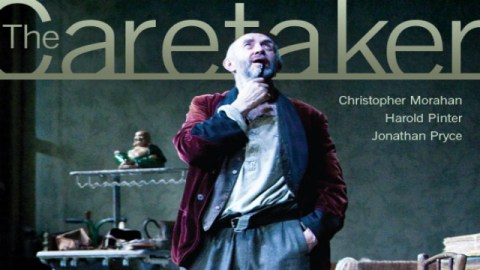Life, Death, and a Good Pair of Shoes: Jonathan Pryce in Harold Pinter’s The Caretaker

The Mind/Body Split in American Acting (and culture)
On the whole, and with a few notable exceptions, Hollywood expects its great actors to play themselves in every role. We want primal authenticity, and view physicalization of character with suspicion. Actors who excel at altering the way they move and talk – at transforming themselves into someone else entirely – are called “character actors” and offered the role of quirky, comical sidekick.
This tradition of psychological realism is largely the influence of New York’s Group Theatre, and actors like Marlon Brando, James Dean, and Paul Newman who made its Methods famous. It also speaks to a deeper strain in American culture – a rugged, straight-shooting pragmatism dating all the way back to the Jamestown settlement.
The English stage acting tradition has no such hangup. There’s a famous, probably apocryphal story about a conversation between Laurence Olivier and Dustin Hoffman on the set of Marathon Man. Hoffman, it is said, had kept himself awake all night to prepare for a scene in which his character was supposed to be exhausted. The trouble was, Hoffman was exhausted for real and in a state of near nervous collapse. “My dear boy,” Oliver is supposed to have said: “My dear boy, why don’t you just try acting? Now go home and sleep.”
Life, Death, and A Good Pair of Shoes
Watching British actor Jonathan Pryce growl and jig and jabber his way through one of the best acting performances I’ve ever seen – as Davies, the homeless interloper in Harold Pinter’s play The Caretaker* – I was reminded once again of the heroic, larger-than-life potency of acting that isn’t constrained by silly distinctions between mind and body. Pryce is an extraordinarily versatile actor. Watch him side by side Brazil, Something Wicked This Way Comes, and The Caretaker, and you’ll barely recognize the man. But he leaves you no time to reflect on the technique behind his shape-shifting (wow…how does he DO that?). He grabs you by the throat and plunges you headfirst into the reality of the play.
In the powerful new revival of Harold Pinter’s 1960 play, this begins with his pressing need to get a decent pair of shoes. “Gotta have a good pair of shoes,” he proclaims: “life and death to me!”
Pryce plays Mac Davies, a homeless man who has been given shelter for the night by Aston, a 30-something who lives alone in a room, surrounded by piles of junk, newspapers, and a kitchy ceramic Buddha. It becomes apparent pretty quickly that there’s something off about Aston. There’s the piles of junk, for one thing. The long, strange silences. The shed he can never quite manage build out back from the pile of plywood in the corner. If only he could build it, he’d have a workshop. Then he could repair the rest of the unusable house! But he can’t seem to get his mind together . . .
The play is full of these kinds of unrealizable aspirations on which everything else depends: If only Mac could get some shoes, he could walk to Sidcup (a suburb) to get the identification papers that prove who he really is. He’s been living under an assumed name, you see, but if he could just get his hands on those papers, he could get a job and put his life back together. But the old shoes Aston offers him are too pointy. And it’s always raining. So Sidcup is always just out of reach . . .
Harold Pinter is Painfully Funny
Aston’s a mild-mannered, somewhat muddleheaded fellow (in Act Two, we get the dark, terrible backstory) who seems content to let Davies bunk with him indefinitely. Enter Mick, Aston’s intense younger brother, who surprises Davies alone in the flat and viciously attacks him – hurling him to the ground and pinning his arm behind his back, then launches into a mad monologue about how Davies is “the spitting image of my uncle’s brother”, who has a “penchant for nuts.”
These sorts of surreally mundane non-sequiturs make Pinter’s writing hilarious and menacing by turns. Taken along with the verbal tics, interruptions, and staccato rhythms that characterize the dialogue, the resemblance to the comic and devastating work of a later playwright, David Mamet (Glengarry Glen Ross, Speed the Plow) is too strong to be coincidental – Pinter continues to exert a powerful influence on our greatest dramatists.
The Caretaker was performed in 1964 at the Liverpool Everyman theatre, where Jonathan Pryce once served as both artistic director and company member. This current production, first staged in 2009, marked Pryce’s return to the Everyman stage after a 35-year absence. It’s a homecoming for Pryce in another sense as well – born and raised in Wales, Pryce left as a young man for the Royal Academy of Dramatic Arts in London. Davies – though he’s cagey about his origins – is Welsh, and Pryce speaks the role with the rhythms and cadences of his homeland.
Christopher Monahan’s spare, precise direction reveals every nuance of the lexicophilic wit and claustrophobic terror that made Pinter a household name when this play first appeared. There’s great slapstick comedy here, too – a perfectly timed tussle over a duffel bag and a spontaneous game of “where’s that damn matchbox?” are as funny as the best of Buster Keaton. As with Kafka, those who don’t “get” Pinter (including many, many directors) miss the humor entirely. There’s plenty of darkness here, too, but it’s the comedy that brightens the edge of the blade.
The Lear of West London
And the blade comes out – literally and figuratively – in Act Two, where the innocent sleepover turns into a territorial struggle between Davies and the two brothers, with Davies scheming to turn one against the other and establish himself as king of the castle. These rising tensions bring out the best in the actors: Alan Cox, as Aston, is both heartbreaking and chilling in his total isolation and impenetrability. As Mick, Alex Hassell is frightening, volatile, and hilariously obsessed with (and surprisingly well versed in) the science of interior decorating.
When the play reaches its most fervent pitch at the end of Act Two, it’s as if The Caretaker has suddenly been possessed by the ghost of King Lear. Pryce takes us on an emotional rollercoaster that rips open the heart of what it means to be old, alone, and embattled – forced to fight up to your last breath for a little bit of dignity, a decent pair of shoes, and a shabby scrap of mattress to sleep on.
The Caretaker is appearing at the Brooklyn Academy of Music through June 17th…if you’re anywhere near New York, stop reading this right now and go buy tickets.
Follow Jason Gots (@jgots) on Twitter




